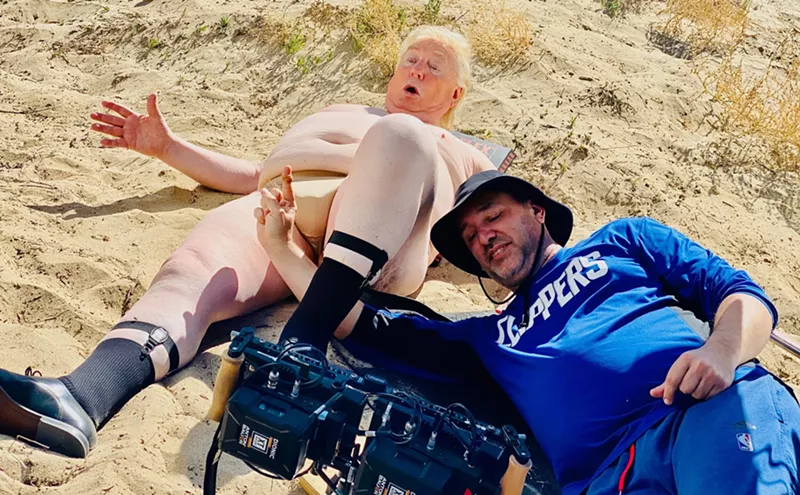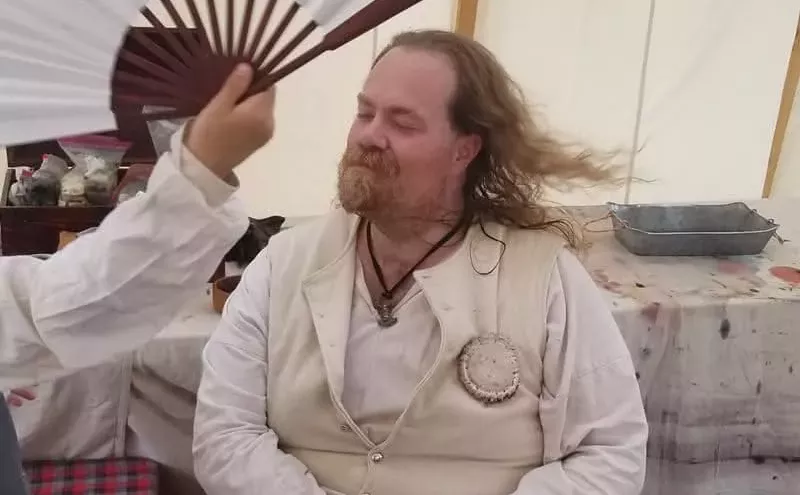If we had learned what we should have from White's murder trial, which is the subject of Emily Mann's Execution of Justice, we might never have witnessed Matthew Shepard's horrific death or a host of injustices that continue to plague our legal system. Mann's 135-minute drama is being presented by the Theatre Group at Theatre on Broadway under the inventive direction of Chip Walton. Although Mann's fact-filled testimonial feels more like a calculated documentary than a soul-shattering tragedy, Walton's engrossing production effectively conveys one community's heartbreaking struggle to reconcile civic responsibility with civil rights.
Before the play begins, recorded conversations with Milk and Moscone and several "man on the street" interviews play on four strategically placed television monitors. As the strains of "We Are Family" reverberate in the background, the monitors depict period newspaper headlines such as "Gays Lose Decisively in Oregon" and lapel buttons with slogans like "Anita Bryant Sucks Oranges" (referring to the Sunkist queen's anti-gay crusades in Florida). After a series of news videos relates the events surrounding the murders of Milk and Moscone, an outlandish drag queen in six-inch platform heels enters from the back of the theater and walks down a wooden runway that rests on several seats in the center section of the audience. Twirling her red feather boa, Sister Boom Boom (Ricardo Barrera) engages a rock-ribbed policeman (Rob Trentadue) in a debate about the crime and its fallout and, in the process, sets the stage for the drama's central conflict. "I got nothin' against people doin' what they want if people don't see it..." the cop says haltingly. In response, Boom Boom muses about the day when Dan White will leave jail without the benefit of protection. Mocking the pleas of nervous city officials, the drag queen says, "I beg you all to love, understand and forgive."
Then the trial participants take their places while the charges are read. On our extreme left, seated on a four-foot-high platform, is the Judge (Brian Thompson). In the dock on the opposite side of the stage are the defendant, Dan White (Chris Reid), and his wife, Mary Ann (Shelly Bordas). A single chair on casters, which alternately represents the witness stand and a police interrogation room, sits center stage and is flanked at the outset by district attorney Norman (Reece Livingstone) and defense attorney Schmidt (Stephen Maestas). From time to time, an onstage television reporter (Trina Magness) and a ubiquitous cameraman deliver live interviews and commentary that are simultaneously fed to the four television screens. Completing the picture of justice on trial, a few audience members sit on both sides of the stage in "jury boxes," and several ordinary citizens of San Francisco, all of whom are portrayed by a fine ensemble of actors, surround the edge of the stage during particularly crucial moments.
Director Walton sustains our interest during the drawn-out legal proceedings by interspersing projected titles that identify the key players in the drama and framing each witness's testimony with evocative video images and sound effects. Also, Walton cleverly bridges the gap between the impersonal media coverage of the trial and the flesh-and-blood citizens who were profoundly affected by its outcome. For example, after White's lawyer successfully pitches his client's ludicrous insanity defense to the jury--days before he murdered Milk and Moscone, White supposedly succumbed to a deep depression brought about by wolfing down an untold number of Twinkies--the performers enact a candlelight vigil on stage to the accompaniment of Samuel Barber's moving (albeit overused by local directors) "Adagio" as televised images depict thousands marching in a post-verdict demonstration at City Hall. As you watch the mourners, both live and recorded, you find yourself in silent agreement with one character who describes the event as being "one of the most eloquent expressions of a community's [reaction to] violence that I have ever seen."
Unfortunately, playwright Mann's occasionally antiseptic treatment drains a few promising scenes of some much-needed conflict. One character, for instance, makes a habit of telling us she wants "to talk about when people are pushed to the wall," but the dramatist affords her only a line or two in which to do that. And as another character remarks, "What was left unsaid was what the trial should have been about," you get the feeling that the same is often true of Mann's play, which, unlike a documentary, should be free to take advantage of the benefits of dramatic license.
All in all, though, Walton and company manage to make a convincing case for their "facts are stubborn things" approach. You can only hope that their efforts fulfill in some measure Harvey Milk's final, prescient wish: "If a bullet should enter my brain, let that bullet destroy every closet door."
Execution of Justice, through March 13 at Theatre on Broadway, 13 South Broadway, 303-860-9360.












